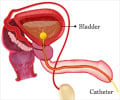Sling operation done during vaginal prolapse surgery reduces the chances of urinary incontinence post-surgery, but at the same time increases the possibilities of adverse effects.

Researchers carried out a study to evaluate if an additional surgery to add support to the urethra could reduce the chances of urinary incontinence following prolapse surgery. The study included women who did not suffer from prior urinary incontinence and were due to undergo vaginal prolapse surgery.
Some of the women in the study received a retropubic midurethral sling during the operation to repair the vaginal prolapse. A sling operation is a procedure where a sling is placed under the urethra to support it and prevent urinary incontinence in conditions of increased intra-abdominal pressure like while laughing, sneezing or during physical activity. The women were assessed at 3, 6 and 12 months following the surgery. A total of 337 women completed the follow-up at 1 year.
Three months following surgery, the incidence of urinary incontinence was nearly half in the group that received the sling operation as compared to those who did not receive the urethral support (23.6% vs 49.4%). This benefit persisted even twelve months following the operation (27.3% vs. 43.0%).
However, the rate of complications was significantly more in the group that underwent the sling operation and included bladder perforation (6.7% vs. 0%), urinary tract infection (31.0% vs. 18.3%), bleeding complications (3.1% vs. 0%), and incomplete bladder emptying (3.7% vs. 0%) in the first 6 weeks after surgery.
The study thus reiterates the advantages of urethral support operations during vaginal prolapse surgery. However, the benefits of the surgery must be weighed against the possibility of serious adverse effects, and the decision should be individualized for each patient.
Reference:
1. A Midurethral Sling to Reduce Incontinence after Vaginal Prolapse Repair; John T Wei et al; N Engl J Med 2012; 366:2358-2367
Source-Medindia















